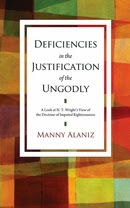Book Review: "Deficiencies in the Justification of the Ungodly" by Manny Alaniz
Manny Alaniz
Wipf and Stock Publishers
199 West 8th Avenue, Suite 3
Eugene, OR 97401-2960
199 West 8th Avenue, Suite 3
Eugene, OR 97401-2960
www.wipfandstock.com
Copyright: 2013
ISBN: 978-1-62032-888-0; $15.00
Reviewed for Deus Misereatur by: Rev. Dr.
Michael Philliber
Deficient Discussions – 1 ½ of 5 stars
In Evangelical Circles, especially among
the Reformed rivulet, New Testament scholar N.T. Wright is either adored or
abhorred. Manny Alaniz has entered the fray with his recent 106 page paperback,
“Deficiencies in the Justification of the Ungodly: A Look at N. T. Wright’s
View of the Doctrine of Imputed Righteousness.” This lengthy booklet promises to unpack Wright’s teaching on the
doctrine of justification, and persuade the reader to hold to the Classic
Protestant position.
“Deficiencies
in the Justification of the Ungodly” breaks down into four basic chapters,
surrounded by an introduction and a conclusion. To put it frankly, the whole
book simply expands on the introduction; read it and you have in essence read
the entire book. There is very little deviation, just a pedestrian expansion.
In the four
chapters Alaniz takes the reader through a naïve rehearsal of the New Perspectives
on Paul “movement” beginning with Krister Stendahl. He then “evaluates” N.T.
Wright’s angle, showing what the author perceives are Wright’s fallacies with
regard to justification. After this, he sets out to explain the Classic Protestant
position on the subject, affirming that in justification God declares the believer
forgiven and in right standing with himself, solely because of Christ’s own
righteousness; and that this gracious gift is received by faith alone. Finally,
the writer attempts to assess Wright’s deficiencies in light of the Classic
Protestant stance. He charges Wright with redefining justification by faith to
mean that this is where God graciously declares who are in his covenant family,
and faith is simply the identification badge one wears to show who is in and
who is out. The author further alleges that Wright drops the imputation of
Christ’s righteousness to the sinner altogether.
It is hard to
take “Deficiencies in the Justification of the
Ungodly” too seriously for several reasons, but one sample one will suffice.
N.T. Wright has written voluminously, close to 40 books and reams of articles,
in which works he has addressed this subject from numerous slants. But Alaniz merely
musters up a booklet. And then, in the Bibliography only 19 of Wright’s books
and 7 of his articles are listed. There are numerous other authors who take a
negative view of Wright, and have at least read most or all of his material,
and spilled gallons of ink and piles of paper to make their case.
There is a deficiency
in this book to grasp the nuances in Wright’s material. In my opinion Wright
does wrongly reprioritize various theological categories (viz., ecclesiology
over soteriology), as well as outright deny certain understandings of
justification, etc. But to say, as the author does repeatedly, that in Wright “there
is no exchange between the righteousness of Christ and the ungodly. The ungodly
do not receive the full benefits of Christ’s righteousness” and that his
ecclesiological emphasis “does not deal with the problem of the guilt due to
sin” (72-3) seems problematic. Just as one example, in Wright’s “Mark for
Everyone”, where he is commenting on Mark 1.9-13 (Jesus’ baptism, and the
Father’s declaration of Jesus being his son), Wright states,
“The whole Christian gospel could be summed up in this point: that when the living God
looks at us, at every baptized and believing Christian, he says to us what he
said to Jesus on that day. He sees us, not as we are in ourselves, but as we
are in Jesus Christ. ( . . . )” Jesus is the Messiah, and the Messiah represents his people. What is true of him
is true of them. ( . . . ) It was because Jesus was and is Messiah that God
said to them, as he does to us today, what he said to Jesus at his baptism. And
without that word from God all we often hear, in our mind’s ear, is doors being
slammed” (4-5).
Though Wright doesn’t use the
theological words, he pictures and affirms justification, including imputation
and forgiveness. These may not be as strong and muscular as we like; they may
not be labelled with the theological tags we want; but they are there
nonetheless. And he rightly makes them flow from union with Christ in a way
that sounds very close to Alaniz’s own words, “This righteousness is the union
of Christ with the sinner whereby Christ’s righteousness belongs to the sinner
and the sins of the ungodly belong to Christ” (56 fn. 49). But the author regularly
misses the subtle, backdoor ways Wright brings these into his material.
“Deficiencies in the Justification of the
Ungodly” attempts to lay out the
Classic Protestant position on justification and how Wright misses the mark,
but struggles to be lucidly coherent. If a reader has never looked into this
doctrine in any depth, or wants to know why some theologians have a beef with
N.T. Wright, he will be better served looking to other resources for clearer
and more fluent substance. I do not recommend this book.
[If you would like to post this on your blog or publish it in your publication, you have me happy permission. But as always, please give credit where credit is due. Mike]




Comments